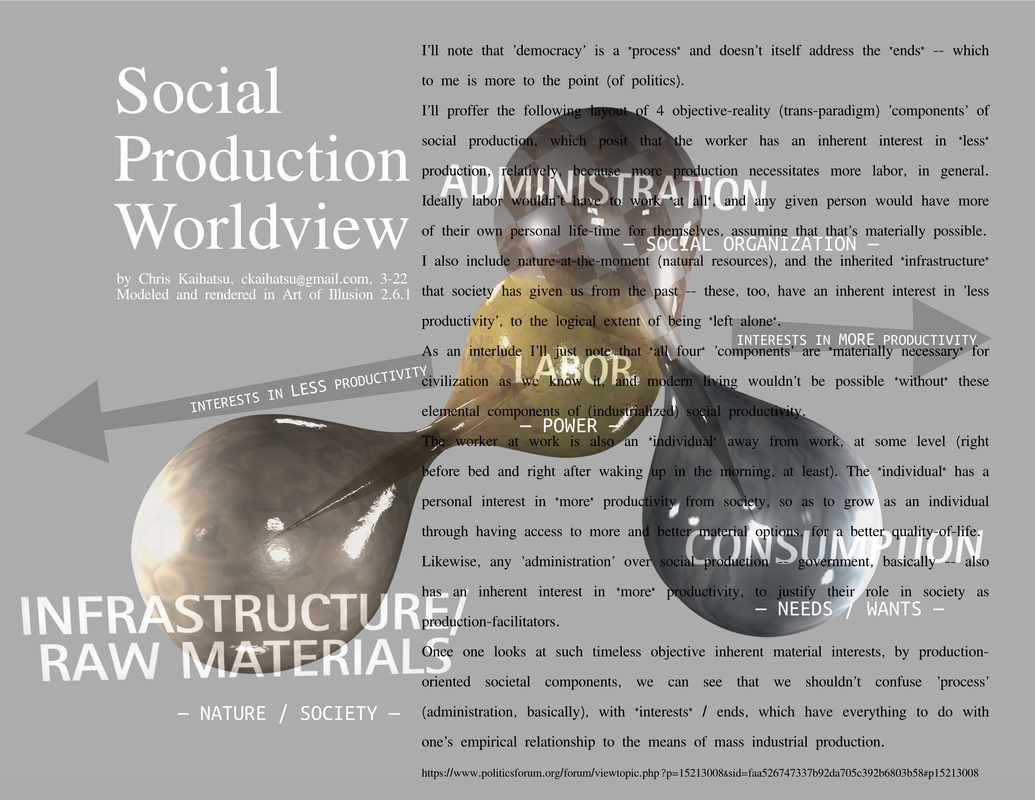Potemkin wrote:
Socialism, just like capitalism, is designed for an economy based on scarcity. Everyone must, or at least, should, do productive work before they can eat - that is, they must contribute to the social wealth at least as many resources as they take from it. Hence the fundamental slogan of socialism: “ He who does not work, neither shall he eat”. This means, of course, eliminating all forms of social and economic parasitism, such as people who refuse to work and live by petty crime, as well as those who live off investments and personal property and do no productive work themselves.
This is clearly not ideal, and in no sense can be called a “workers’ paradise”. It is more equitable and just than capitalism, since it has eliminated parasitism, but it is still an economy based on scarcity.
Communism is the next step, and requires an economy based on abundance rather than scarcity. And communism has its own “fundamental slogan”: “From each according to their ability, to each according to their need.” This would be the highest possible form of social and economic organisation.
I'll argue, Potemkin, that both the *ethos*, *and* the structure of socialism / communism, are better suited to a material economics / reality of *satisfaction* / fulfillment, across-the-board, rather than one of market-driven, industry-constrained 'relieving-scarcity'. Socialism and communism are obviously more egalitarian-minded, and egalitarian, in their outlook and distribution of social production.
I really think that the market mechanism is *better* suited to addressing a situation of material scarcity, but it *quickly* accomplishes that task, yet continues to operate in 'primitive-accumulation' mode, mindlessly extracting ever-more surplus labor value, despite now-accomplished conditions of material *abundance*. (Consider that the market only deals with *economic* demand, and not actual, organic *human* need, as for the basics of modern life and living -- *economic* demand is quickly satiated, as for *luxury* production, but anything speculatively produced and unsold is meant to be *destroyed* in practice so as to keep it off the market, to prevent such speculative surplus overproduction from pulling prices / values down.)
Capitalism mechanically enforces its *artificial scarcity*, requiring actual *material destruction*, up through *world wars*, for its bottom-line functioning.
https://en.wikipedia.org/wiki/Artificial_scarcity---
More 'internally', I have a specific standing critique with the Marxist 'labor chit', or 'labor voucher' conception:
Wellsy wrote:
His [Robinson Crusoe's] stock-book contains a catalogue of the various objects he possesses, of the various operations necessary for their production, and finally, of the labour-time that specific quantities of these products have on average cost him.
We shall assume, but only for the sake of a parallel with the production of commodities, that the share of each individual producer in the means of subsistence is determined by his labour-time.
ckaihatsu wrote:
Okay, but there's no guarantee of quantities adding-up, inventory-wise, on the whole -- just *saying* 'rewards-for-labor-[time]' doesn't necessarily mean that quantities produced will properly correspond to materials consumed, because quantities-produced is apples-and-oranges in comparison to quantities-consumed, since workers individually produce at different rates, over different items, than they consume-at.
https://www.politicsforum.org/forum/viewtopic.php?p=15172107#p15172107
---
ckaihatsu wrote:
And:
Again, though, I'm not taking issue with people's own varying *work* abilities, and the varying individualized *compensation*, per individual, indexed to the overall average rate of socially-necessary productivity, per work role, per hour -- what I'm finding lacking, technically-speaking, is what the most fundamental, key-indexing factor / variable is to be. With all labor notes / labor vouchers / labor chit proposals, it's work-role time (hours), indexed to *other* work-role time (hours), and I'm saying that, technically, that's *problematic*, because people are still being incentivized *individually*, with labor notes, while there's an overarching socio-political political interest in collective *egalitarianism*, for all rates of productivity, to the common good, to be equivalent (per work role, per hour of work).
In other words the *politics* of collectivism is lacking and taking a hit if the post-capitalist political economy isn't taking per-hour varying *productivity* into account, which these conventional labor-notes-type proposals / frameworks *don't*.
To be stark, if I work at the factory for 8 hours doing socially necessary work that produces 1,000,000 widgets, while the next person does 8 hours of the same but only produces 800,000 widgets, and we both get the same compensation, of an 8-hours-note, this is *not* equal productivity to *the collective*.
There would be a macro-level (socio-political) *societal* interest in all 8-hour-notes being issued to workers for work done with the same *productivity* resulting. Why should one person be off by 200,000 units compared to someone else, for the same compensation *from* the social commons?
viewtopic.php?p=15171952#p15171952












 - By Pants-of-dog
- By Pants-of-dog